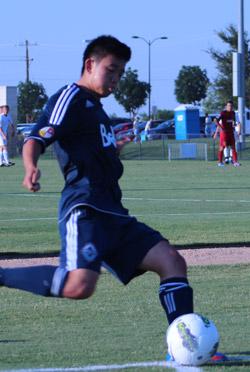 The Vancouver Whitecaps benefited from
The Vancouver Whitecaps benefited fromnot playing high school soccer.

There were a number of obstacles in the way for teams in Frisco, Texas two weeks ago during the USSF Development Academy Playoffs - the blazing heat, the difficult opposition, and the three games in four days.
For the eight that advanced to Finals Week from the U18 age group, five of them shared a common thread. They were all part of conferences that had eliminated high school soccer from the schedule.
The Texas, Northwest, and SoCal Division moved to a 10-month season for the 2011-12 year. Like with any major change, there was a period of time where the coaches and players had to adapt and there was some trepidation about where it was headed.
 The Vancouver Whitecaps benefited from
The Vancouver Whitecaps benefited fromHowever, by the end of the year, the coaches were singing the praise of having their players together without a necessitated break for scholastic sports.
“The ability for our guys to train over the 10-months has really allowed them to take off,” De Anza Force U18 Eric Yamamoto told TopDrawerSoccer.com. “I am very excited about how far they’ve come.”
While Yamamoto, who is also a goalkeeper coach for the U.S. Soccer, did not specifically mention it, the fitness of his team was clearly superior to the other teams in his group.
De Anza Force U18 scored five goals over the course of three games to win its group. Four of those goals came after the 75th minute.
The Northern California club was not the only one singling out the difference that a 10-month season made.
“I think it helped us out quite a bit,” Chivas USA Academy Director Teddy Chronopoulos told TopDrawerSoccer.com. “We were able to space out our games the way we wanted to and we had a period of time toward the end of the season, which allowed us to rest going into this.”
Chivas USA’s final regular season game came on June 2, so the MLS Academy had three weeks to prepare for Texas while the other three teams in its group [New England Revolution, Charlotte Soccer Academy, and New York Red Bulls] played their final regular season games a week before playoffs began.
“We knew the conditions coming in so it was about making sure they were mentally strong, properly hydrated, and eating the right food,” Chronopoulos concluded while also giving plenty of credit to his players for committing to the program.
Vancouver Whitecaps, FC Dallas, and Solar Chelsea SC rounded out the five U18 teams that advanced to Finals Week from the non-high school conferences.
Despite the success in the older age group, the 10-month clubs did not fare nearly as well in the younger age with only one team advancing [Pateadores] out of the nine that made the playoffs.
However, a few of those eight just missed out on advancing due to tiebreakers and other unfavorable results on the final day.
While the debut season and moderate success for clubs in the 10-month schedule will help prove a point for USSF, it will not quell the debate about high school athletics.
The point of social development is not going to be quantified with wins or advancement to Finals Week.
Yet, for those who played in Frisco, Texas during the Playoffs, the loss of high school soccer was the last thing on any player’s mind.